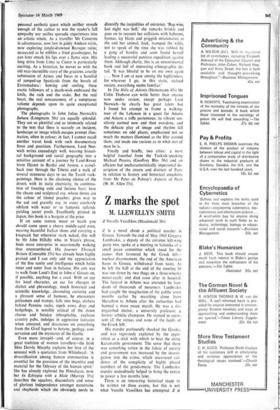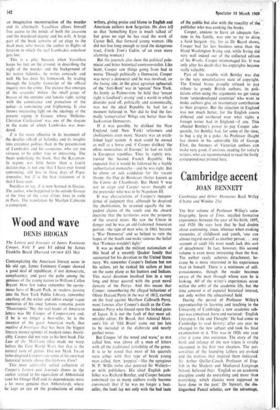Z Vassilis Vassilikos (Macdonald 30s)
Z marks the spot
M. LLEWELIXN SMITH
Z is a novel about a political murder in Greece. Towards the end of May 1963 Gregory Lambrakis, a deputy of the extreme left-wing
party EDA, spoke at a meeting in Salonika of a small peace committee which stood for the causes then favoured by the Greek left— nuclear disarmament, the end of the American bases in Greece, withdrawal from NATO. As he left the hall at the end of the meeting he was run down by two thugs on a three-wheeler motor-cycle; and died soon after in hospital. The funeral in Athens was attended by hun- dreds of thousands of mourners. Lambrakis had caught the imagination of the public some months earlier by marching alone from Marathon to Athens after the authorities had banned a mass peace march. He was a dis- tinguished doctor, a university professor, a former athletic champion. He seemed to repre- sent all the virtues and none of the faults of the Greek left.
His murder profoundly shocked the Greeks, and was vigorously exploited by the oppo- sition as a stick with which to beat the tiring Karamanlis government. The sense that there was something rotten in the fabric of society and government was increased by the investi- gation into the crime, which uncovered evi- dence of the complicity of highly placed members of the gendarmerie. The Lambrak is murder undoubtedly helped to bring the centre to power a few months later.
There is an interesting historical study to be written on these events; but this is not what Vassilis Vassilikos has attempted. Z is an imaginative reconstruction of the murder and its aftermath. Vassilikos allows himself free access to the minds of both the assassins and the murdered deputy and his wife. A large part of the book consists of an elegy to the dead man, who moves the author to flights of lyricism in which the real Lambrakis somehow gets lost.
This is a pity, because when Vassilikos keeps his feet on the ground, in describing the night of the murder and the background of his native Salonika, he writes concisely and well. He has done his homework, by wading through the lengthy transcript of the official inquiry into the crime. The picture that emerges of the assassins' milieu---the small gangs of bravos of the extreme and lunatic right, acting with the connivance and protection of the police—is convincing and frightening. It also throws interesting light on the ideology of the present regime in Greece, whose `Hellenic- Christian Civilisation' was one of the slogans in the name of which Lambrakis was mur- dered.
Z is far more effective in its treatment of the derelict riffraff of Salonika and its insights into extremist politics than in the presentation of Lambrakis and his associates, who are too virtuous to be either true or interesting. The thesis underlying the book, that the Karaman- lis regime was little better than a fascist dictatorship. is not one that I have ever found convincing, still less in these days of Papa- dopoulos; but Z is the best statement of it that I have seen.
Needless to say, Z is now banned in Greece. The author, who happened to be outside Greece at the time of the coup d'etat, lives in exile, in Paris. The translation by Marilyn Calmann is competent.



































 Previous page
Previous page